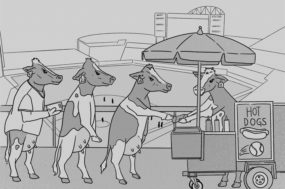U.S. House Agriculture Committee Ranking Member Collin C. Peterson, D-Minnesota, made the following statement after releasing a dairy reform discussion draft that would offer protection, create stability and inspire growth in the dairy sector. The draft language is based on reform proposals put forward by the dairy industry. “I released this discussion draft now because we need to act before the next farm bill. If we have another dairy crisis like we had in 2009, we could lose half our dairies. The discussion draft allows us to keep the ball moving while continuing to have a dialogue with the dairy industry.
“Current dairy programs aren’t working; they’re not keeping up with the challenges facing today’s dairy industry. This proposal addresses these challenges. The proposal creates a strong safety net that will provide the support all sectors of the diverse industry need during tough times.
“I’ve never seen the industry as united as it is now and I appreciate their efforts to work together and find a solution that will ensure Americans continue to have access to a safe and abundant supply of fresh milk,” Peterson said.
Peterson’s proposal consists of three main components – a margin protection program, a Dairy Market Stabilization Program and reforms to the Federal Milk Marketing Order system. These proposals would provide a safety net based on margin protection, rather than price; and replace both the Dairy Product Price Support Program (DPPSP) and the Milk Income Loss Contract (MILC) Program.
“This is a long-anticipated and very welcome next step in the process of upgrading dairy policy to better provide farmers with protection, stability, and the opportunity for growth,” said Jerry Kozak, President and CEO of NMPF.
“We appreciate the attention that Congressman Peterson has brought to this issue, and we will be working with him and his colleagues on Capitol Hill to help advance and implement the concepts of Foundation for the Future.”
The legislative language is termed a discussion draft, rather than a bill, as it now provides members of Congress with the opportunity to allow fellow congressmen, key stakeholders and constituents the opportunity to view the language prior to the official introduction of a bill.It also allows backers of the draft to seek cosponsors who wish to affix their names to the bill, prior to it being formally introduced.
Kozak noted that the economic impact of the reforms contained in the Foundation for the Future proposal will save the government money, compared to current dairy program spending.
Such a development “becomes a critical part of the effort to help us move it forward, because all of the talk in Washington lately has been about cutting spending, and specifically, which farm program expenditures can be reduced,” Kozak said. “We now have a good answer to that question where dairy programs are concerned.”
The Congressional Budget Office has evaluated, or scored, the legislative draft to assess its budget impact, and that process necessitated two changes, compared to the original Foundation for the Future package as proposed by NMPF.
With respect to the Dairy Producer Margin Protection Program (DPMPP), the amount of basic (no cost to the farmer) margin coverage has been adjusted to 75 percent of a producer’s production history. This change saves money, compared to the current baseline for dairy.However, the DPMPP supplemental coverage option remains at 90 percent of the producer’s production history, as NMPF had proposed.
In addition, due to a number of issues that deal with tax provisions and the overall federal budget deficit, CBO has determined that 50 percent of any dollars collected as a result of the implementation (i.e. “triggering in”) of the Dairy Market Stabilization Program (DMSP) will be remitted to the Treasury, rather than being spent to purchase dairy products. This provision ensures a measure of cost savings sufficiently significant to reduce the overall cost of FFTF.
Kozak said that NMPF will spend the coming weeks building support for the legislative draft, in anticipation of the subsequent formal introduction of a bill in the House, “with an emphasis on obtaining bipartisan support from across the country for this critically-important improvement in dairy policy. We also hope the Senate will take up the charge, so that we can get the legislation passed and implemented as soon as possible.” PD
—From NMPF and House Committee on Agriculture news releases




